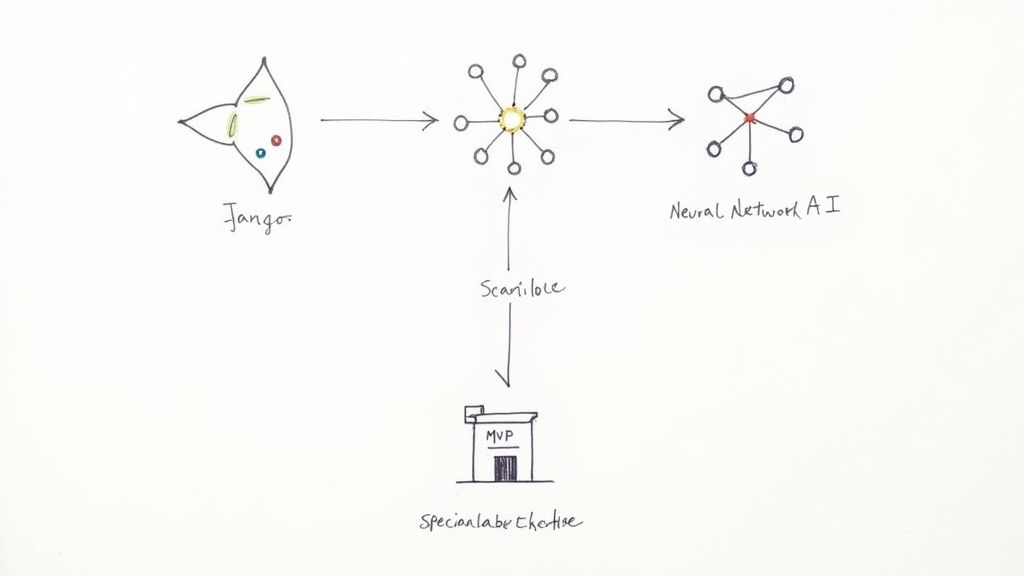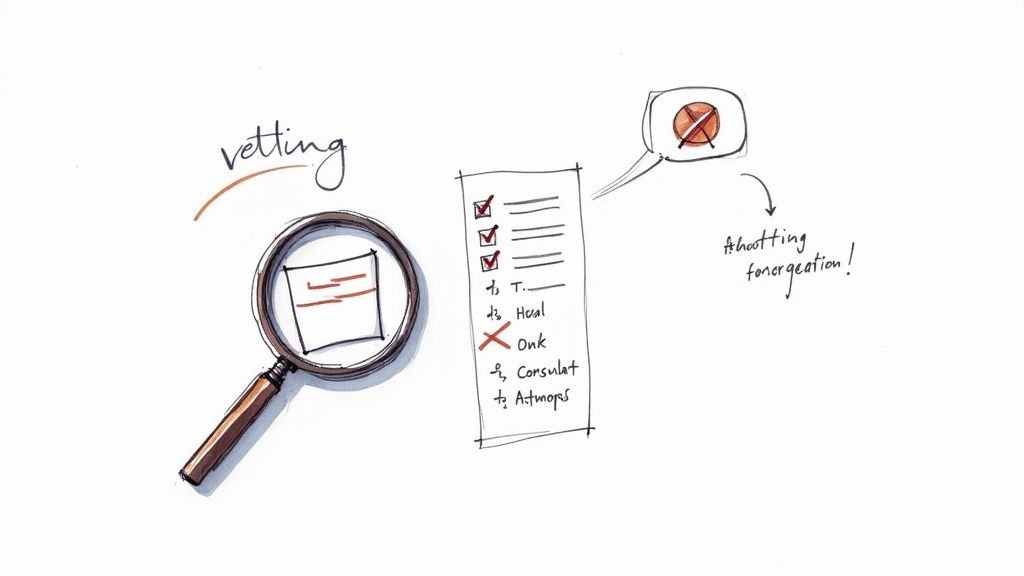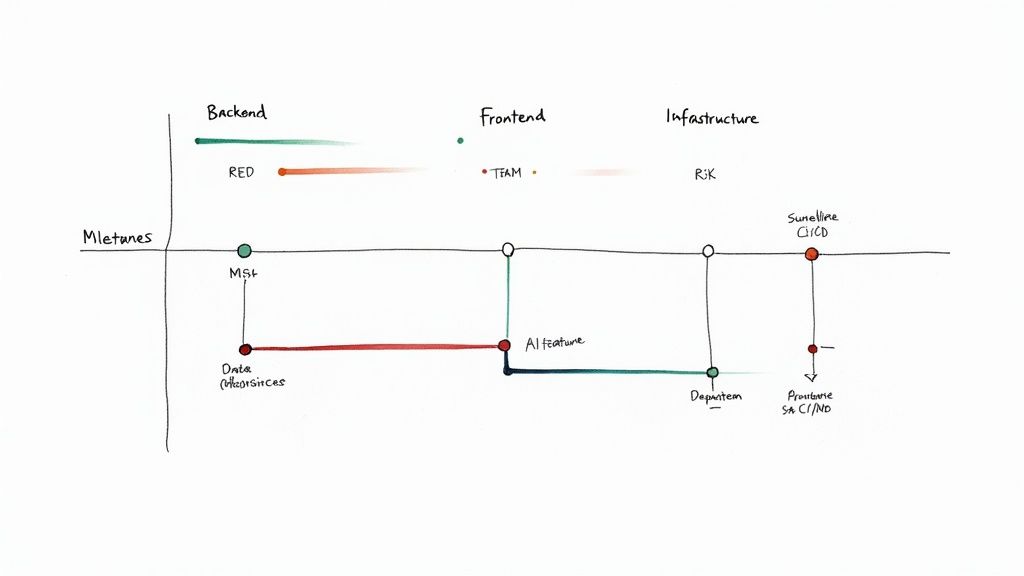
It's a story I've seen play out a dozen times. You've got a world beating idea, but the journey from that spark of genius to a real, scalable product feels like you're trying to find your way through a thick fog. The pressure to make perfect technical decisions right out of the gate is intense. This is exactly where a good startup tech consultant proves their worth.
That Blurry Line Between a Big Idea and a Real Product
Picture this. We had a client, a small team buzzing with excitement and running on fumes and coffee, huddled around a whiteboard. They had a killer concept for a GenAI platform that helps small businesses whip up marketing content. The market need was there, they were getting great feedback, and the energy was electric.
But then the questions started coming. One by one, they piled up, each heavier than the last.
Suddenly, the whiteboard wasn't a canvas for vision anymore; it was a battlefield of technical anxiety. Should they build the backend with Django for its batteries included approach and solid security, or is Node.js a better choice for potential real time features? How do you even begin to design a system that can handle a thousand users today but won't fall over at a million tomorrow without a total rewrite?
The Weight of Early Decisions
This is the exact moment where so many promising startups get bogged down. The founders know, almost instinctively, that the architectural choices they make now will echo for years. One wrong turn could mean months of painful refactoring, a sluggish product that users hate, or worse, a security breach that kills the company. The fear of racking up technical debt before you've even written a line of code is paralyzing.
It's a classic case of analysis paralysis. The team starts spinning its wheels, debating things like:
- Database Choices: Do we go with a classic relational database like PostgreSQL for its reliability, or does a NoSQL solution give us more flexibility down the road?
- API Design: What's the smartest way to structure our API so that we're ready for a mobile app or third party integrations later?
- MVP Scope: What's the absolute bare minimum we can build to prove our concept without creating a flimsy prototype that just falls apart?
Every question feels like a trap. The desire to build something solid and scalable is in a head on collision with the desperate need to move fast and get something—anything—into the hands of users. This is that murky, uncomfortable space between a great idea and a real business. It's where momentum dies and doubt starts to win.
This early stage uncertainty is completely normal. The challenge isn't about having all the answers, but about knowing how to find them efficiently without derailing your progress.
This is precisely where a startup tech consultant stops being a luxury and becomes a strategic guide. They aren't just there to sling code. They step into the chaos and bring clarity, offering a battle tested perspective to help you navigate these critical early decisions with confidence. They turn that foggy path into a clear roadmap.
What a Startup Tech Consultant Actually Does
So, what does a startup tech consultant actually do all day? It's a fair question, and the role is often misunderstood. Some founders see them as just expensive, temporary coders.
But a great consultant operates on a completely different level. They're a unique mix of strategic partner, temporary co founder, and team accelerator, all rolled into one.
Think of them as a seasoned guide on a mountain expedition. They don't just carry your pack. They help you pick the right gear (your tech stack), read the weather (market trends), and find the safest, fastest path to the summit—which, for a startup, is product market fit. Their job is to bridge that massive chasm between what's technically possible and what's commercially smart.
This is the journey most products take, from that initial spark of an idea to a real product launch.

That "blurry middle" is where most of the risk, uncertainty, and wasted effort live. It's precisely where a consultant's clarity is worth its weight in gold.
Bridging Strategy and Execution
A consultant's real value comes from their ability to operate at multiple altitudes at once. One moment, they're deep in the weeds debating the merits of a specific database indexing strategy. The next, they're in a strategy session connecting that technical choice all the way back to the company's three year growth plan.
This dual focus is what makes them so effective. They aren't just thinking about building the feature; they're thinking about building the right feature, in the right way, to support the business for the long haul.
This role has become absolutely vital as technology gets more complex. In fact, the IT consulting market in the US alone is projected to hit a staggering $759.6 billion by 2025. This isn't just hot air; it's driven by the explosion of data and specialized fields like AI that demand expertise most startups simply don't have in house.
Core Functions and Deliverables
So, what can you expect them to actually do? Let's break down their typical activities. Before we go deeper, here's what you should have in mind.
A skilled startup tech consultant will usually tackle these key areas:
- Architectural Planning: They design the blueprint for your entire system. This isn't just about code; it's about ensuring the whole thing is scalable, secure, and won't need a total rewrite in six months. Think server architecture, API design, and data modeling.
- Technology Roadmap Creation: They work with you to create a phased plan for development that lines up perfectly with your business goals. This helps you decide what to build now, what to build next, and—just as importantly—what can wait.
- Hands On Prototype Development: Many of the best consultants are builders at heart. They'll write foundational code, build out the initial MVP, and set up your development environment with best practices from day one.
- Team Mentoring and Upskilling: A great consultant works to make themselves obsolete. They mentor your junior developers, establish solid coding standards, and help you hire the right full time talent when the time is right.
The ultimate goal of a startup tech consultant isn't just to solve a technical problem. It's to build technical capability within your organization, leaving you stronger and more self sufficient than when they started.
Many consultants now offer specialized AI consulting services to guide founders through the incredibly complex worlds of GenAI and VoiceAI. For startups in this space, that kind of focused expertise is invaluable for turning a powerful idea into a real, functional product.
This is just one example of how they provide more than general advice. For a deeper dive into a related role, you might be interested in my guide on what product engineering consultants do.
The Telltale Signs Your Startup Needs a Consultant
How do you know when it's time to call in the cavalry? Thinking about a startup tech consultant isn't admitting defeat—it's a classic founder move. Smart, strategic, and all about getting ahead faster. It's a sign you're serious about winning, not a sign of weakness.
Most founders I meet are scrappy as hell. They can figure anything out. But sometimes, you get so deep in the day to day grind that you lose sight of the bigger picture. Little problems start popping up, like warning lights on your car's dashboard. Ignore them, and you're heading for a breakdown that'll cost you time, money, and your team's sanity.
Let's walk through the classic signals I see that tell me a startup is ready for an expert guide.
Your Tech Debates Have No End
I once worked with a sharp AI startup that burned almost three months arguing about their core backend framework. It was a classic showdown: Django, with its batteries included ecosystem, versus Node.js, with its reputation for real time speed.
The meetings were endless. Whiteboards were filled, argued over, and erased. Both sides had solid points, but no one could pull the trigger. While they were trapped in this analysis paralysis, a competitor shipped a bare bones MVP and started grabbing market share.
That kind of gridlock is a huge red flag. When your team is stuck endlessly debating foundational tech choices without tying them back to actual business goals, you're burning your most precious resource: time.
An outside consultant is the perfect tie breaker here. They bring an objective, battle tested perspective. They'll help you weigh the trade offs not in a theoretical vacuum, but against the stark reality of your product roadmap and launch deadlines.
Your MVP Is Hitting a Wall
The first version of your product was a thing of beauty. It worked perfectly for your handful of beta testers. But now you're onboarding real users, and the cracks are starting to show. Pages are sluggish, the database times out, and little bugs are popping up faster than you can squash them.
This is a make or break moment. Your MVP proved the concept, but it was never built to scale. The "duct tape and glue" that got you this far is about to snap. Suddenly you're facing a minefield of tough questions:
- Do we refactor the mess we have, or bite the bullet and rewrite everything?
- How do we swap out the database for something more scalable without taking the whole site down?
- What's the quickest way to add a caching layer to stop the bleeding?
These aren't simple fixes. A consultant who has taken systems from a few hundred users to millions can give you a clear architectural blueprint, saving you from catastrophic—and expensive—missteps. If your tech stack feels like it's held together with duct tape, we should probably talk about how technical consulting can help.
You Are a Non Technical Founding Team
You've got the industry expertise, a killer business plan, and a vision that could change the world. But when the conversation turns to technology, you're in uncharted waters. You're trying to hire your first engineer or get quotes from dev shops, but you don't really know what "good" looks like.
This is a dangerous place to be. Without a technical advisor in your corner, you're at risk of:
- Hiring the wrong people: You might bring on someone who talks a great game but lacks the deep architectural vision you'll need six months from now.
- Overpaying for the wrong solution: An agency could sell you on a complex, enterprise level stack when a simpler, faster approach would get you to market sooner.
- Losing credibility with investors: Smart investors will poke holes in your tech strategy. Vague answers are a giant red flag that can kill a deal.
A startup tech consultant can serve as your interim CTO. They'll help you vet candidates, review code, and turn your business goals into a technical spec that developers can actually build. They give you the confidence to make sound tech decisions, ensuring your vision is built on rock, not sand.
Unlocking Growth with Specialized Expertise
Not all consultants are cut from the same cloth. Let's be real: if you needed serious heart surgery, you wouldn't just search for "a doctor." You'd find a cardiac surgeon, someone who's done that exact procedure hundreds of times. The same logic applies to your startup's tech.

General advice gets you in the game, but specialized expertise is what lets you win it. A top tier startup tech consultant brings deep, current knowledge in the specific technologies that punch way above their weight class, letting you build faster, smarter, and more securely. This is especially true for powerful stacks like Django for your backend and the exploding fields of Generative AI and VoiceAI.
The Django Advantage: Speed and Security
For most startups, the race to build a solid Minimum Viable Product (MVP) is everything. I once watched a brilliant team of engineers build their SaaS backend from scratch. They spent weeks—valuable, irreplaceable weeks—building user authentication, an admin panel, and basic security. These are all things Django gives you on day one.
That's the magic of bringing in a Django specialist. They don't waste time reinventing the wheel. They lean on the framework's "batteries included" philosophy to get a secure, scalable, and maintainable backend live in a fraction of the time.
A Django focused consultant helps you:
- Launch Faster: By using built in components, they focus engineering hours on your unique features, not boilerplate infrastructure. We dive deeper into this in our guide to startup MVP development services.
- Avoid Common Pitfalls: They've seen where the framework's sharp edges are and can steer you away from architectural dead ends that could cripple you later on.
- Build a Production Grade Foundation: They implement best practices for security, database management, and performance from the get go, making sure your MVP doesn't fall over the second it meets real users.
Navigating the AI Frontier
AI isn't some futuristic idea anymore; it's a core engine for innovation right now. In fact, AI has become the number one driver for tech consulting investments, with AI infrastructure alone causing a nearly 8% jump in tech spending.
But building with GenAI or VoiceAI is like navigating a jungle. The terrain of foundation models, fine tuning techniques, and RAG systems changes almost weekly. Without an experienced guide, it's incredibly easy to get lost.
An AI consultant's job isn't just to plug in an API. It's to help you find the right model, build the right data pipeline, and design a system that delivers real, tangible value to your users—not just a cool tech demo.
They translate a vague goal like "we want to use AI" into a concrete, shippable feature. For instance, they can architect a RAG system that lets your app answer complex questions based on your private company docs, turning a simple chatbot into a powerful knowledge base. A startup tech consultant provides the focused expertise needed for companies looking to successfully navigate digital transformation challenges.
Bringing in a specialist isn't an admission that your team lacks skills. It's a strategic move to buy back your most valuable asset: time. You're hiring someone who has already made the mistakes, climbed the learning curve, and built what you're trying to build. That distilled experience is the ultimate accelerator for any startup with big ambitions.
How To Find and Vet the Right Tech Consultant
Finding the right consultant can feel like searching for a needle in a haystack. You need someone who gets both your tech stack and your business vision, and let's be honest, the best ones aren't just hanging out on the big job boards. They're usually found through networks, reputation, and communities where real expertise is on display.

This process is about more than just checking boxes on a resume. You're looking for a temporary strategic partner, someone who can steer your ship through foggy waters. Let's break down how to find and—just as importantly—how to properly vet them.
Where To Find Top Talent
Forget generic platforms. Your search for a great startup tech consultant should be targeted and deliberate. The goal is to find individuals who aren't just looking for a gig but are deeply engaged in their craft.
Here are the most fruitful hunting grounds:
- Niche Communities and Events: Think conferences like DjangoCon or PyCon, or specialized online communities. People who present or actively contribute to these spaces are often at the top of their game.
- Referrals from Your Network: This is the gold standard. Ask other founders, your investors, or advisors who they trust. A warm introduction from a respected peer is incredibly powerful.
- Open Source Contributions: Platforms like GitHub are a living portfolio. Look for consultants who contribute to relevant open source projects. Their code, communication style, and problem solving skills are all on public display.
Vetting Beyond the Resume
Once you have a few candidates, the real work begins. A flashy resume can hide a multitude of sins. Your job is to dig deeper to assess not just their technical chops but also their mindset and communication skills. This is where you move from what they've done to how they do it.
The scale of the technology consulting industry is vast. Leading firms like Accenture generated $64.9 billion in 2024 with a global workforce of over 774,000, while others like KPMG reported $36 billion in revenue. While you're not hiring a massive firm, this illustrates the incredible diversity of consultant profiles out there. A great consultant for a startup is a specialized practitioner who can operate with agility—a very different profile from someone at a large enterprise firm.
A consultant's true value isn't just in the code they write; it's in the clarity they bring. If they can't explain a complex topic simply, they probably don't understand it well enough to build it for you.
To get to the heart of their capabilities, focus your interview process on these key areas:
- Problem Solving Approach: Give them a real, thorny problem your startup is facing. Don't ask for a perfect solution on the spot. Instead, listen to the questions they ask. Do they jump straight to code, or do they first seek to understand the business context and user impact?
- Communication Style: Ask them to explain a complex technical concept as if you were a non technical investor. Their ability to translate jargon into plain English is a direct measure of their ability to align technology with business goals.
- Past Project Deep Dive: Pick a project from their portfolio and go deep. Ask them what went wrong, what they would do differently now, and how they handled disagreements with the client. This reveals their self awareness and resilience.
A Practical Consultant Vetting Checklist
To make this process more concrete, here's a checklist you can use. Think of it as a guide to ensure you're asking the right questions and looking for the right signals.
| Area to Evaluate | Key Questions to Ask | What to Look For |
|---|---|---|
| Technical Expertise | Can you walk me through a complex technical challenge you solved? How do you stay current with new technologies in our stack? | Deep, practical knowledge, not just buzzwords. Evidence of continuous learning and hands on experience. |
| Business Acumen | How would this technical decision impact our business goals (e.g., user acquisition, revenue)? | Ability to connect technical solutions to business outcomes. They should be asking "why" as much as "how." |
| Communication & Fit | Explain [a complex concept] to me like I'm a non technical stakeholder. How do you handle disagreements on technical direction? | Clarity, empathy, and the ability to listen. Look for someone who collaborates, not dictates. |
| Process & Methodology | What does your typical engagement process look like? How do you define and measure success for a project like ours? | A clear, structured, yet flexible approach. They should be able to articulate deliverables and milestones clearly. |
| Past Performance | Can you provide references from past startup clients? What was the biggest mistake you made on a past project and what did you learn? | Verifiable track record of success with similar companies. Humility and evidence of learning from failures. |
This checklist isn't about finding someone who scores perfectly on every point. It's about finding the consultant with the right balance of skills for your specific needs right now.
The Red Flag Checklist
Sometimes, knowing what to avoid is just as important as knowing what to look for. Be wary of these warning signs during your vetting process:
- The "One Size Fits All" Approach: If their solution to every problem sounds suspiciously like the last project they worked on, they may be a one trick pony, not a strategic thinker.
- Inability to Admit Mistakes: A consultant who has never made a mistake is a consultant who hasn't built anything interesting. Look for humility and a willingness to discuss lessons learned from failures.
- Vague Answers on Deliverables: They should be able to clearly define what success looks like, what you'll get at the end of the engagement, and how you'll measure progress along the way.
Finding the right startup tech consultant is a critical step, much like hiring a key team member. For those needing ongoing strategic oversight, exploring fractional CTO services might be the next logical step in your journey.
So, What's Your Next Move?
We've covered a lot of ground, from the fuzzy, early stage idea to the concrete steps of bringing in an expert guide. Building a startup is a marathon, not a sprint, and knowing when to pull over and ask for directions is the mark of a smart founder, not a weak one. It's all about making deliberate choices that build real momentum.
Before you dive back into the chaos, let's boil all of this down into a quick reference guide. Think of it as the cheat sheet for the next time you feel that familiar tug of "we're stuck."
The Core Lessons, Distilled
Here are the absolute essentials every founder needs to internalize when thinking about a startup tech consultant:
- Recognize the Red Flags Early: Those endless debates over tech stacks? An MVP that groans under the slightest load? A non technical team trying to architect a complex AI product? These aren't just "growing pains." They are giant, flashing signs that you need an objective, expert voice to cut through the noise and get you moving again.
- Specialized Expertise is a Force Multiplier: General advice is everywhere. Deep, hands on experience in a specific stack like Django or a thorny field like GenAI is what actually gets you to market faster. A true specialist has already walked the path you're on and knows exactly where the landmines are buried.
- Vetting is a Two Way Street: Don't just look at a consultant's technical chops. You have to dig into their business sense, their communication style, and how they actually solve problems. The best consultant isn't just a coder for hire; they're a strategic partner who asks "why" as much as they figure out "how."
- They Build Capability, Not Just Code: Here's the real goal: a great consultant works to make themselves obsolete. They should leave your team smarter, your processes tighter, and your technical foundation far more solid than when they arrived.
A startup tech consultant is an investment in clarity and velocity. You don't just measure their value in lines of code. You measure it in the catastrophic mistakes they help you sidestep and the speed at which they propel you to your next critical milestone.
This whole process is about swapping uncertainty for a well executed plan. Take a hard look at your current challenges. Are you stuck in architectural paralysis? Feeling the burn of scaling pains? Is there a critical knowledge gap holding your whole vision back?
If the answer is yes, bringing in a seasoned guide might be the single most powerful move you can make right now. It's how you protect your vision and, more importantly, accelerate your growth.
Frequently Asked Questions
Alright, even with the best plan, the practical questions always surface. It's one thing to talk strategy, but it's another to get into the nuts and bolts of how working with a consultant actually plays out.
Let's hit pause and tackle some of the most common questions I hear from founders. This is all about clearing the air so you can make a smart, clear eyed decision.
How Much Does a Startup Tech Consultant Cost?
This is always question number one, and the honest to god answer is: it depends. Rates are all over the map based on a consultant's experience, where they're based, and how specialized they are—especially in hot fields like GenAI.
But just looking at the rate is the wrong way to frame it. The real comparison isn't a consultant's fee versus a junior developer's salary.
The true comparison is the consultant's fee versus the crippling cost of a major architectural mistake, a six month launch delay, or a security breach that vaporizes user trust. A great consultant doesn't just cost you money; they save you from burning multiples of their fee on expensive rework and missed opportunities.
Think of it as buying velocity and de risking your entire roadmap. They help you build the right thing, the right way, the first time. That kind of efficiency almost always pays for itself by getting you to revenue faster.
What Is the Typical Engagement Model?
Flexibility is everything here. Any good consultant knows that no two startups have the same fire to put out, so engagements are almost always custom fit. There's no "one size fits all" package.
That said, most projects tend to fall into a few common buckets:
- Short Term Architectural Review: This is a quick, high impact sprint. A consultant dives deep into your existing code or plans for a few weeks, validates your approach, and hands you a concrete report with a punch list of actionable recommendations.
- Fractional CTO Retainer: Perfect for ongoing strategic guidance without the burn rate of a full time exec. The consultant carves out a set number of hours each month to mentor your team, oversee architecture, and keep your tech roadmap on track.
- Project Based Sprint: Got a specific feature you need to build or an MVP you need to ship yesterday? This is your model. The scope, deliverables, and timeline are locked in upfront, and the consultant gets hands on to push it across the finish line.
The right model for you boils down to your immediate goals and budget. The single most important thing is to define the scope and what "done" looks like with absolute clarity before a single line of code is written.
Will a Consultant Write All the Code for My Product?
This is a critical question to get straight from the jump. The answer really depends on the consultant and what you've hired them to do. Some are pure strategists, focusing on high level architecture and team leadership.
Others are builders at heart who love getting their hands dirty in the code. I find the most effective consultants are a hybrid of both.
They might architect the core system and write the most critical, foundational code themselves. Then, they use that solid base to help you hire and train a full time engineering team to take ownership and build out the rest of the product.
Be crystal clear about this during the vetting process. The best consultants don't just build for you; they build with you, leaving your team stronger and more self sufficient than they found them.
Feeling stuck on your technical roadmap or need an expert guide to navigate your next build? As a Kuldeep Pisda, I specialize in helping early stage startups accelerate their product delivery with robust Django backends and cutting edge AI features. Let's talk about building something great together. Find out more at https://kdpisda.in.
Become a subscriber receive the latest updates in your inbox.



Member discussion